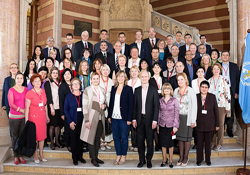12th Flagship Course on Health Systems Strengthening: Focus on noncommunicable diseases

WHO
The 12th annual Flagship Course on Health Systems Strengthening took place on 9–13 May, 2016 in Barcelona, Spain. The course focused on the health systems' response to noncommunicable diseases (NCDs), with a combination of theoretical learning and practical applications through several country cases. It was designed and delivered by WHO/Europe through the WHO Barcelona Office for Health Systems Strengthening.
Feedback from participants
"This course has a very comprehensive programme that covers the structure, functions and goals of health systems. With the case studies that we are analyzing, we can see exactly what is going right and what models went wrong. It is a very good course to help decision-makers understand and rethink what the strengths and weaknesses of their health systems are. In Moldova, we are currently changing the contracting system and the practical examples that we are seeing here will surely be used as a guideline," said Ruxanda Glavan, Minister of Health of the Republic of Moldova.
"This training programme has been incredibly fruitful, and it has got me thinking of some changes that we would need to implement in order to improve the health system in my country," said Marat Kaliev, Chairman of the Mandatory Health Insurance Fund of Kyrgyzstan.
"The course has been very informative and useful, not only from a substantive point of view but also from the perspective of meeting other professionals working in the field of health systems strengthening. One of the things I found most useful was the practical case study from Catalonia, which helped us understand the enabling factors that led to such a successful health system. Many of the lessons learned and the experimental, innovative work that we have done here can be translated to other countries in the region," observed John Macauley, Regional HIV, Health and Development Programme Specialist at the UNDP Regional Centre for Europe and the Commonwealth of Independent States.
"The quality of the speakers is simply very, very high, and that's combined with the fact that the facilities are just wonderful and very well aligned to a good creative learning environment," said Liam McCormack, Policy Manager at the Department of Health of Ireland.
Experience through different learning activities
This week-long intensive and interactive course took a systematic approach to health systems strengthening in order to better address the growing burden of NCDs. Discussions during the course, group work and informal networking opportunities enabled participants to learn from each other.
Through the different learning activities, the participants obtained experience and useful skills on how to face health system challenges, diagnose barriers to achieving better NCD outcomes, improve service delivery to scale up key interventions for primary prevention and disease management, review health financing instruments and financial incentives that can help alleviate the burden of NCDs, set out the main problematic questions and find out reasonable solutions and measures for adoption.
The course brought together 52 participants from Albania, Armenia, Belarus, Bosnia and Herzegovina, Estonia, Georgia, Greece, Iceland, Ireland, Kyrgyzstan, Latvia, the Netherlands, Poland, Portugal, the Republic of Moldova, Romania, the Russian Federation, Slovenia, Tajikistan, Turkey and Uzbekistan. Among the participants, there were government officials at national and regional levels from ministries of health and health insurance funds, and also from ministries of economy and finance. These officials were joined by representatives of academic institutions, international organizations, NGOs, and health service providers in the public and private sectors.



